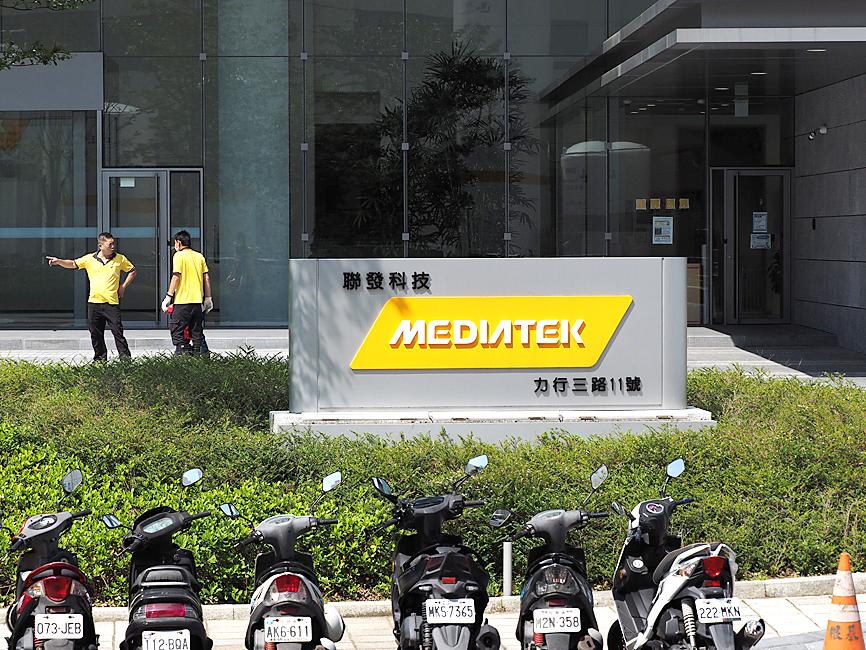Handset chip designer MediaTek Inc (聯發科) plans to fully acquire broadband chip supplier IC Plus Corp (九暘電子) for NT$1.51 billion (US$52.94 million) through one of its subsidiaries, the company said on Sunday.
Airoha Technology Corp (絡達科技), a MediaTek subsidiary, has offered to buy all 68.55 million shares of IC Plus at NT$22 per share, MediaTek said in a regulatory filing.
The figure represents a 15.8 percent premium on IC Plus’ closing price of NT$19 on Friday.

Photo: David Chang, EPA-EFE
IC Plus yesterday rose by the daily limit of 10 percent to NT$20.9 on the Taipei Exchange.
The deal “will help the company develop broadband communications chips and related products, and enhance the company’s competitiveness. The transaction will have a positive impact on the company’s business,” MediaTek said in the filing.
IC Plus, which makes chips used primarily in Ethernet transceivers or switches, would see its shares delisted from the exchange upon the completion of the transaction.
The deal is subject to the approval of shareholders at an extraordinary meeting on Feb. 23.
IC Plus swung into a loss of NT$997 million in the first three quarters of this year, compared with a net profit of NT$157 million in the same period last year.
That translated into losses per share of NT$1.48 in the first three quarters, compared with earnings per share of NT$2.34 a year earlier.
This is the third acquisition launched by MediaTek this year.
Two weeks ago, the company announced plans to acquire a 20 percent stake, or 12.4 million shares, in Asix Electronics Corp (亞信電子) at NT$40 per share through a private placement.
Asix specializes in supplying chips used in high-speed Internet cards.

With this year’s Semicon Taiwan trade show set to kick off on Wednesday, market attention has turned to the mass production of advanced packaging technologies and capacity expansion in Taiwan and the US. With traditional scaling reaching physical limits, heterogeneous integration and packaging technologies have emerged as key solutions. Surging demand for artificial intelligence (AI), high-performance computing (HPC) and high-bandwidth memory (HBM) chips has put technologies such as chip-on-wafer-on-substrate (CoWoS), integrated fan-out (InFO), system on integrated chips (SoIC), 3D IC and fan-out panel-level packaging (FOPLP) at the center of semiconductor innovation, making them a major focus at this year’s trade show, according

SEMICONDUCTOR SERVICES: A company executive said that Taiwanese firms must think about how to participate in global supply chains and lift their competitiveness Taiwan Semiconductor Manufacturing Co (TSMC, 台積電) yesterday said it expects to launch its first multifunctional service center in Pingtung County in the middle of 2027, in a bid to foster a resilient high-tech facility construction ecosystem. TSMC broached the idea of creating a center two or three years ago when it started building new manufacturing capacity in the US and Japan, the company said. The center, dubbed an “ecosystem park,” would assist local manufacturing facility construction partners to upgrade their capabilities and secure more deals from other global chipmakers such as Intel Corp, Micron Technology Inc and Infineon Technologies AG, TSMC said. It

DEBUT: The trade show is to feature 17 national pavilions, a new high for the event, including from Canada, Costa Rica, Lithuania, Sweden and Vietnam for the first time The Semicon Taiwan trade show, which opens on Wednesday, is expected to see a new high in the number of exhibitors and visitors from around the world, said its organizer, SEMI, which has described the annual event as the “Olympics of the semiconductor industry.” SEMI, which represents companies in the electronics manufacturing and design supply chain, and touts the annual exhibition as the most influential semiconductor trade show in the world, said more than 1,200 enterprises from 56 countries are to showcase their innovations across more than 4,100 booths, and that the event could attract 100,000 visitors. This year’s event features 17

EXPORT GROWTH: The AI boom has shortened chip cycles to just one year, putting pressure on chipmakers to accelerate development and expand packaging capacity Developing a localized supply chain for advanced packaging equipment is critical for keeping pace with customers’ increasingly shrinking time-to-market cycles for new artificial intelligence (AI) chips, Taiwan Semiconductor Manufacturing Co (TSMC, 台積電) said yesterday. Spurred on by the AI revolution, customers are accelerating product upgrades to nearly every year, compared with the two to three-year development cadence in the past, TSMC vice president of advanced packaging technology and service Jun He (何軍) said at a 3D IC Global Summit organized by SEMI in Taipei. These shortened cycles put heavy pressure on chipmakers, as the entire process — from chip design to mass